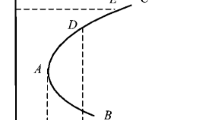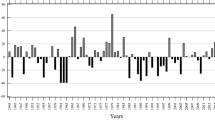Abstract
Medium-Term Hydro Generation Scheduling (MTHGS) plays an important role in the operation of hydropower systems. In the first place, this paper presents a Chance Constrained Model for solving the optimal MTHGS problem. The model recognizes the impact of inflow uncertainty and the constraints involving hydrologic parameters subjected to uncertainty are described as probabilistic statements. It aims at providing a more practical technique compared to the traditional deterministic approaches used for MTHGS. The stochastic inflow is expressed as a simple discrete-time Markov chain and Stochastic Dynamic Programming is adopted to solve the model. Then in order to use the information of long-term inflow forecast to improve dispatching decisions, a Dynamic Control Model is developed. Short-term forecast results of the current period and long-term forecast results of the remaining period are treated as inputs of the model. Finally, the two methods are applied to MTHGS of Xiluodu hydro plant in China. The results are compared to those obtained from Deterministic Dynamic Programming with hindsight and advantages and disadvantages of the two methods are analyzed.





Similar content being viewed by others
References
Ackooij WV, Henrion R, Möller A, Zorgati R (2014) Joint chance constrained programming for hydro reservoir management. Optim Eng 15:509–531
Ahmad A, El-Shafie A, Razali SFM, Mohamad ZS (2014) Reservoir optimization in water resources: a review. Water Resour Manag 28:3391–3405
Allen R, Bridgeman S (1986) Dynamic programming in hydropower scheduling. J Water Resour Plan Manag 112:339–353
Arunkumar R, Jothiprakash V (2012) Optimal reservoir operation for hydropower generation using non-linear programming model. J Inst Eng (India) 93:111–120
Azaiez MN, Hariga M, Al-Harkan I (2005) A chance-constrained multi-period model for a special multi-reservoir system. Comput Oper Res 32:1337–1351
Carpentier P-L, Gendreau M, Bastin F (2012) Midterm hydro generation scheduling under uncertainty using the progressive hedging algorithm. Centre interuniversitaire de recherche sur les réseaux d'entreprise, la logistique et le transport. CIRRELT-2012-35
Carpentier PL, Gendreau M, Bastin F (2013) Long-term management of a hydroelectric multireservoir system under uncertainty using the progressive hedging algorithm. Water Resour Res 49:2812–2827
Chen P-H, Chen L-M, Liu A, Chen H-C (2009) Application of particle swarm optimization to hydro generation scheduling. In: Energy and Environment Technology, 2009. ICEET'09. International conference on. IEEE, pp 541–544
Faber BA, Stedinger J (2001) Reservoir optimization using sampling SDP with ensemble streamflow prediction (ESP) forecasts. J Hydrol 249:113–133
Gil E, Bustos J, Rudnick H (2003) Short-term hydrothermal generation scheduling model using a genetic algorithm. IEEE Trans Power Syst 18:1256–1264
Glotić A, Glotić A, Kitak P, Pihler J, Tičar I (2014) Optimization of hydro energy storage plants by using differential evolution algorithm. Energy 77:97–107
Jiang Z et al (2014) Total output operation chart optimization of cascade reservoirs and its application. Energy Convers Manage 88:296–306
Larsen CT, Doorman GL, Mo B (2015) Evaluation of scenario reduction methods for stochastic inflow in hydro scheduling models. In: PowerTech, 2015 I.E. Eindhoven. pp 1-6
Liao X, Zhou J, Ouyang S, Zhang R, Zhang Y (2014) Multi-objective artificial bee colony algorithm for long-term scheduling of hydropower system: a case study of China. Water Util J 7:13–23
Naresh R, Sharma J (2000) Hydro system scheduling using ANN approach. IEEE Trans Power Syst 15:388–395
Ouarda T, Labadie J (2001) Chance-constrained optimal control for multireservoir system optimization and risk analysis. Stoch Env Res Risk A 15:185–204
Singh VP, Cui H (2015) Entropy theory for streamflow forecasting. Environmental Processes 2:449–460
Sreenivasan K, Vedula S (1996) Reservoir operation for hydropower optimization: a chance-constrained approach. Sadhana 21:503–510
Stedinger J, Faber B, Lamontagne J (2013) Developments in stochastic dynamic programming for reservoir operation optimization. In: World Environmental and Water Resources Congress. pp 1266–1278
Turgeon A (1981) Optimal short-term hydro scheduling from the principle of progressive optimality. Water Resour Res 17:481–486
Vasan A, Raju KS (2009) Comparative analysis of Simulated annealing, Simulated quenching and genetic algorithms for optimal reservoir operation. Appl Soft Comput 9:274–281
Walczykiewicz T, Biedroń I, Kwiecień M (2012) How to quantify risk in integrated water resources management. Eur Water 38:33–42
Xie M, Zhou J, Li C, Zhu S (2015) Long-term generation scheduling of Xiluodu and Xiangjiaba cascade hydro plants considering monthly streamflow forecasting error. Energy Convers Manag 105:368–376
Xu B, Boyce SE, Zhang Y, Liu Q, Guo L, Zhong P-A (2016) Stochastic programming with a joint chance constraint model for reservoir refill operation considering flood risk. J Water Resour Plan Manag 143:04016067
Yeh WWG (1985) Reservoir management and operations models: a state-of-the-art review. Water Resour Res 21:1797–1818
Yuan L, Zhou J, Li C, Xie M, Mo L (2016) Benefit and risk balance optimization for stochastic hydropower scheduling. Water Resour Manag 30:3347–3361
Zeng Y, Wu X, Cheng C, Wang Y (2013) Chance-constrained optimal hedging rules for cascaded hydropower reservoirs. J Water Resour Plan Manag 140:04014010
Zhang M, Yang F, Wu J-X, Fan Z-W, Wang Y-Y (2016) Application of minimum reward risk model in reservoir generation scheduling. Water Resour Manag 30:1345–1355
Acknowledgments
This work is supported by the Key Program of the Major Research Plan of the National Natural Science Foundation of China (No. 91547208), the National Natural Science Foundation of China (No. 51579107), the National Key R&D Program of China (2016YFC0402205), the State Key Program of National Natural Science of China (No. 51239004) and the Training Program of the Major Research Plan of the National Natural Science Foundation of China (No. 91647114). Special thanks are given to the anonymous reviewers and editors for their constructive comments.
Author information
Authors and Affiliations
Corresponding authors
Rights and permissions
About this article
Cite this article
Zhou, J., Xie, M., He, Z. et al. Medium-Term Hydro Generation Scheduling (MTHGS) with Chance Constrained Model (CCM) and Dynamic Control Model (DCM). Water Resour Manage 31, 3543–3555 (2017). https://doi.org/10.1007/s11269-017-1683-9
Received:
Accepted:
Published:
Issue Date:
DOI: https://doi.org/10.1007/s11269-017-1683-9




